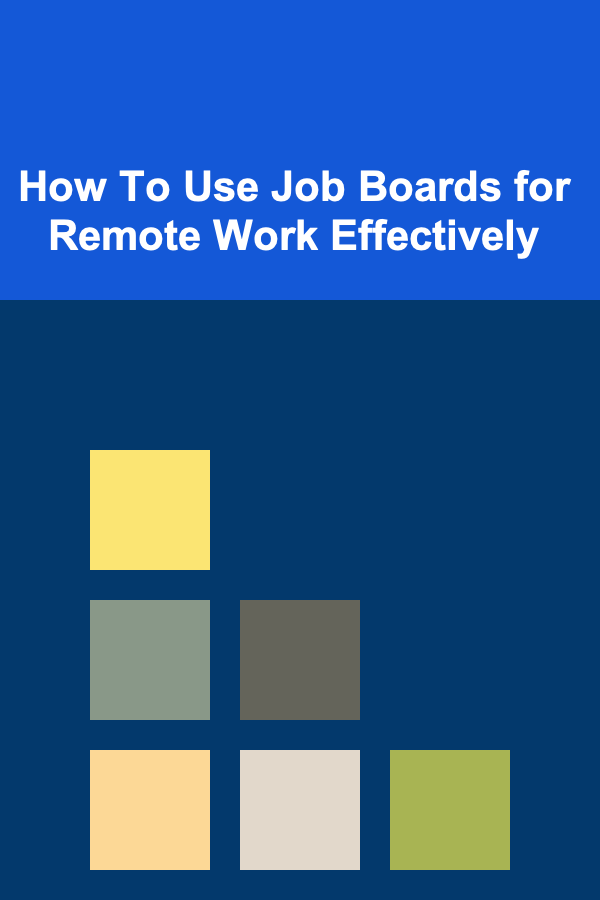
How To Use Job Boards for Remote Work Effectively
ebook include PDF & Audio bundle (Micro Guide)
$12.99$8.99
Limited Time Offer! Order within the next:

In the age of digital transformation, remote work has become more than just a trend---it's a fundamental shift in how businesses operate and how employees structure their lives. The rise of job boards specifically targeting remote opportunities has been a game-changer for both companies and job seekers. As remote work continues to grow, the use of job boards has become an essential tool for finding and securing remote work positions. However, while job boards provide a wealth of opportunities, knowing how to use them effectively is key to landing the right job.
This article will explore how to use job boards for remote work effectively. It will provide tips and strategies to help job seekers navigate the complexities of finding remote positions, optimize their profiles, and ultimately secure their dream remote job.
Understanding Job Boards and Their Role in Remote Work
Job boards are online platforms where employers post job openings, and job seekers can apply for positions. Some job boards are general, listing a wide variety of positions across industries, while others specialize in specific fields or types of work, such as remote positions.
For remote work, job boards act as a bridge between companies offering flexible or fully remote opportunities and job seekers who are looking to break free from the traditional office environment. These platforms have become crucial tools for connecting people with work that matches their skills, interests, and lifestyle preferences.
Types of Job Boards for Remote Work
Not all job boards are created equal, and it's essential to differentiate between the types available when looking for remote positions.
-
General Job Boards
Platforms like Indeed, Glassdoor, and LinkedIn offer a wide variety of job listings, including remote positions. While these sites are not focused exclusively on remote work, they do offer filters that allow you to search specifically for remote jobs.
-
Remote-Specific Job Boards
Some platforms specialize entirely in remote work. These job boards focus on companies that embrace remote or flexible work arrangements. Notable examples include:
- We Work Remotely: A popular job board for remote work across various industries.
- Remote.co: Offers a curated list of remote job opportunities in different sectors.
- FlexJobs: Provides a comprehensive database of remote and flexible job listings, but it requires a subscription fee.
-
Freelance Marketplaces
For those interested in project-based work, platforms like Upwork, Fiverr, and Freelancer offer opportunities for freelancers to find remote jobs. These platforms typically focus on short-term or contract work, but they are also valuable for building a remote career.
-
Industry-Specific Job Boards
Many industries have niche job boards tailored to their specific field, such as TechCareers for tech jobs or DesignJobs for design-focused roles. Many of these boards also feature remote positions, often in specialized sectors like web development, marketing, or writing.
By understanding the different types of job boards available, you can focus your efforts on the ones that are most likely to yield remote work opportunities in your desired field.
Optimizing Your Profile for Remote Work
Before diving into the world of job applications, it's important to optimize your profile on job boards. Your online profile is often the first impression that potential employers will have of you, and in the case of remote work, it's crucial that it reflects not only your professional skills but also your ability to thrive in a remote environment.
1. Craft a Compelling Resume and Cover Letter
While job boards often allow you to upload your resume, don't assume that just submitting a generic document will be enough to catch an employer's attention. Tailor your resume and cover letter for each job application, highlighting relevant skills and experiences that match the specific job requirements.
For remote positions, emphasize skills that are particularly important for remote work, such as:
- Time management: Showcase your ability to work independently and meet deadlines.
- Communication: Mention your proficiency in using remote communication tools like Slack, Zoom, or Teams.
- Self-discipline: Explain how you can maintain focus and productivity without direct supervision.
Including specific examples of past remote work or freelance projects can further demonstrate your suitability for remote roles.
2. Highlight Remote Work Experience
If you've worked remotely in the past, be sure to emphasize this experience. Employers often prioritize candidates who are familiar with the unique challenges and benefits of remote work. If you've had success with remote teams, highlight your ability to collaborate across time zones, manage virtual projects, and navigate remote work tools.
If you don't have direct remote work experience, focus on transferable skills that demonstrate your ability to thrive in a remote environment, such as:
- Adaptability: Showcase how you've handled change in the past.
- Problem-solving: Share examples where you've solved challenges independently.
- Virtual collaboration: Highlight any experience working with distributed teams, even if it was within an office setting.
3. Complete Your Online Profile
Many job boards, especially remote-specific ones, allow you to create a detailed profile that includes your skills, qualifications, and work preferences. Take the time to fill out all relevant sections of your profile. Be specific about:
- Your preferred work schedule: If you're open to flexible hours or specific time zones, mention this upfront.
- Your skill set: List technical skills, software proficiency, and any remote tools you're comfortable using (e.g., Google Workspace, Trello, Asana).
- Your preferred work environment: If you thrive in certain types of remote settings, such as full-time freelance or part-time remote, make sure to mention that.
The more complete and specific your profile, the more likely you are to be noticed by employers.
Searching for Remote Jobs on Job Boards
Once your profile is ready, it's time to start searching for remote jobs. The process of finding the right remote job is a mix of strategy and persistence. The goal is to not only find a job that fits your skills but also one that aligns with your lifestyle and work preferences.
1. Use the Right Search Filters
Most job boards allow you to filter job listings based on various criteria, including job type (full-time, part-time, freelance), location (remote), and industry. Use these filters effectively to narrow down the search results to jobs that are remote.
On platforms like LinkedIn and Indeed, you can filter for "remote jobs," and some job boards like We Work Remotely automatically show only remote opportunities. Be sure to set up customized alerts for specific job categories, so you're notified as soon as a relevant remote position is posted.
2. Set Clear Preferences
When searching for remote work, it's important to establish clear preferences in terms of the types of positions you're willing to consider. For example:
- Do you prefer full-time or part-time remote work?
- Are you open to freelance or contract-based roles, or do you prefer long-term, stable employment?
- What industries or job functions are you most interested in?
By narrowing your focus, you can avoid wasting time on jobs that aren't aligned with your career goals and lifestyle.
3. Research Companies Offering Remote Work
Instead of relying solely on job boards to find remote work opportunities, take a proactive approach by researching companies that are known for offering remote positions. Many companies now have dedicated "remote job" pages where they list all their current remote openings. Some examples of companies that regularly offer remote work include:
- Automattic (the parent company of WordPress)
- GitLab
- Basecamp
By targeting specific companies that align with your career interests, you can increase your chances of finding a job that suits your skills and lifestyle.
Applying for Remote Jobs
Once you've identified relevant remote positions, it's time to apply. Applying for remote jobs requires more than just submitting your resume; you need to put your best foot forward.
1. Tailor Your Application for Each Job
Avoid sending out generic applications. Instead, tailor your resume, cover letter, and portfolio (if applicable) to match the specific requirements of each job listing. Highlight your remote work experience, adaptability, and any other relevant skills or experiences that align with the job.
2. Follow the Application Instructions Carefully
Job postings for remote work often come with specific instructions on how to apply, especially when it comes to remote communication or project submission. Follow these instructions meticulously to show that you can follow directions and pay attention to detail---two qualities that are highly valued in remote employees.
3. Showcase Your Remote Work Skills
Employers who offer remote positions often look for candidates with strong communication, time-management, and collaboration skills. Be sure to highlight these skills in your application and provide concrete examples of how you've demonstrated them in past roles.
Additionally, consider including a brief video introduction, where you can showcase your communication skills, professionalism, and enthusiasm for the position. This small effort can set you apart from other applicants.
Following Up and Networking
After applying for remote positions, it's essential to follow up with employers and engage in networking opportunities.
1. Follow Up on Your Applications
If you haven't heard back from a potential employer within a week or two, consider sending a polite follow-up email to express your continued interest in the position. This can help keep you on the employer's radar and may prompt them to review your application again.
2. Network with Remote Workers
Join online communities and forums for remote workers. These networks can provide valuable insights into job opportunities, company cultures, and remote work best practices. Platforms like Reddit, Slack, and LinkedIn host groups where remote job seekers and workers can connect, share resources, and offer advice.
Networking is also an excellent way to learn about job openings that might not be listed on job boards. Often, companies prefer to hire through referrals or internal recommendations, so networking can open doors to hidden opportunities.
Conclusion
Job boards are invaluable resources for finding remote work, but using them effectively requires more than just submitting resumes. By optimizing your profile, conducting strategic searches, tailoring your applications, and following up on opportunities, you can significantly increase your chances of landing a remote job that aligns with your skills and lifestyle.
Remember that finding the right remote job is a process that takes time and persistence. Stay proactive, engage with online communities, and continue learning about the evolving world of remote work. With the right approach, job boards can serve as the gateway to a successful and fulfilling remote career.

How to Create a Checklist for Organizing a Holiday Party
Read More
How to Create a Portfolio of Stunning Travel Photos to Attract Clients
Read More
How to Use Outdoor Lighting to Deter Criminals
Read More
The Importance of a Growth Mindset in Career Development
Read More
How to Leverage ChatGPT for Conceptual Data Analysis
Read More
How to Cook Healthy Low-Fat Meals
Read MoreOther Products

How to Create a Checklist for Organizing a Holiday Party
Read More
How to Create a Portfolio of Stunning Travel Photos to Attract Clients
Read More
How to Use Outdoor Lighting to Deter Criminals
Read More
The Importance of a Growth Mindset in Career Development
Read More
How to Leverage ChatGPT for Conceptual Data Analysis
Read More